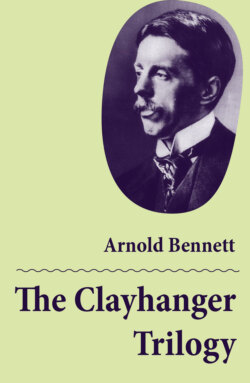Читать книгу The Clayhanger Trilogy (Consisting of Clayhanger + Hilda Lessways + These Twain) - Arnold Bennett - Страница 99
На сайте Литреса книга снята с продажи.
Four.
ОглавлениеHe did not hold the key, and even had he held it he was too young, too inexperienced, to have used it. As with gathering passion the eyes of Darius assaulted the window-pane, Darius had a painful intense vision of that miracle, his own career. Edwin’s grand misfortune was that he was blind to the miracle. Edwin had never seen the little boy in the Bastille. But Darius saw him always, the infant who had begun life at a rope’s-end. Every hour of Darius’s present existence was really an astounding marvel to Darius. He could not read the newspaper without thinking how wonderful it was that he should be able to read the newspaper. And it was wonderful! It was wonderful that he had three different suits of clothes, none of them with a single hole. It was wonderful that he had three children, all with complete outfits of good clothes. It was wonderful that he never had to think twice about buying coal, and that he could have more food than he needed. It was wonderful that he was not living in a two-roomed cottage. He never came into his house by the side entrance without feeling proud that the door gave on to a preliminary passage and not direct into a living-room; he would never lose the idea that a lobby, however narrow, was the great distinguishing mark of wealth. It was wonderful that he had a piano, and that his girls could play it and could sing. It was wonderful that he had paid twenty-eight shillings a term for his son’s schooling, in addition to book-money. Twenty-eight shillings a term! And once a penny a week was considered enough, and twopence generous! Through sheer splendid wilful pride he had kept his son at school till the lad was sixteen, going on seventeen! Seventeen, not seven! He had had the sort of pride in his son that a man may have in an idle, elegant, and absurdly expensive woman. It even tickled him to hear his son called ‘Master Edwin,’ and then ‘Mister Edwin’; just as the fine ceremonious manners of his sister-in-law Mrs Hamps tickled him. His marriage! With all its inevitable disillusions it had been wonderful, incredible. He looked back on it as a miracle. For he had married far above him, and had proved equal to the enormously difficult situation. Never had he made a fool of himself. He often took keen pleasure in speculating upon the demeanour of his father, his mother, his little sister, could they have seen him in his purple and in his grandeur. They were all dead. And those days were fading, fading, gone, with their unutterable, intolerable shame and sadness, intolerable even in memory. And his wife dead too! All that remained was Mr Shushions.
And then his business? Darius’s pride in the achievement of his business was simply indescribable. If he had not built up that particular connexion he had built up another one whose sale had enabled him to buy it. And he was waxing yearly. His supremacy as a printer could not be challenged in Bursley. Steam! A double-windowed shop! A foreman to whom alone he paid thirty shillings a week! Four other employees! (Not to mention a domestic servant.) ... How had he done it? He did not know. Certainly he did not credit himself with brilliant faculties. He knew he was not brilliant; he knew that once or twice he had had luck. But he had the greatest confidence in his rough-hewing common sense. The large curves of his career were correctly drawn. His common sense, his slow shrewdness, had been richly justified by events. They had been pitted against foes—and look now at the little boy from the Bastille!
